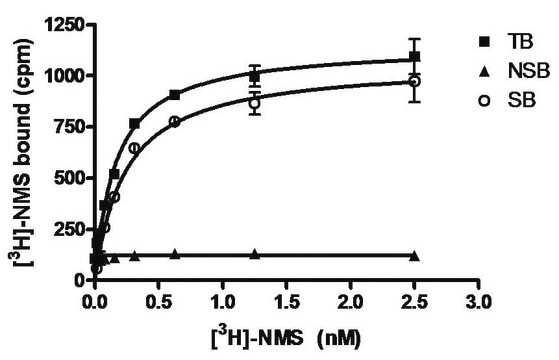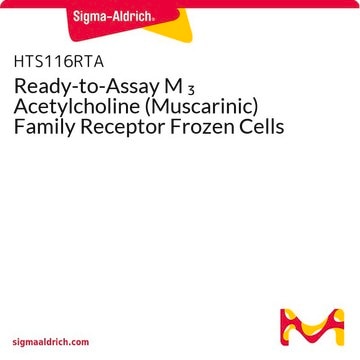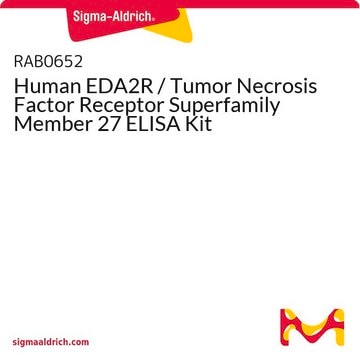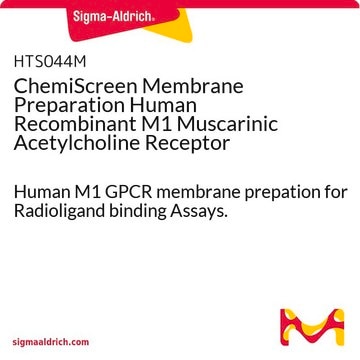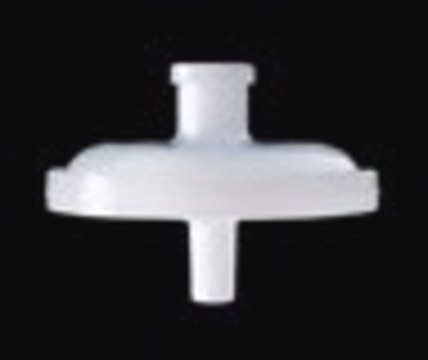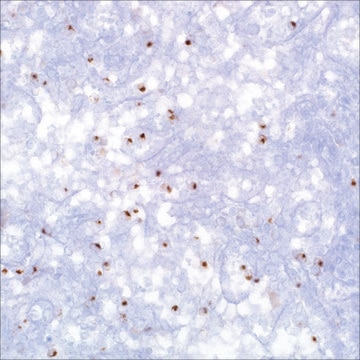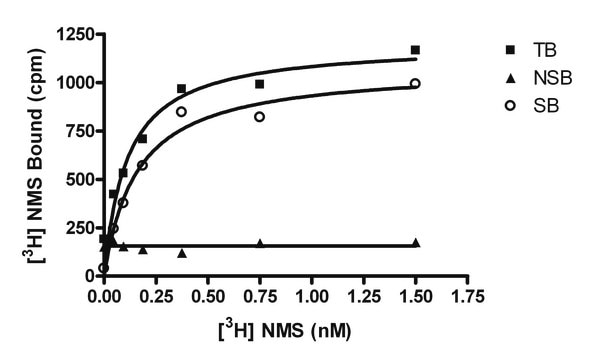HTS116M
ChemiSCREEN Human M3 Muscarinic Acetylcholine Receptor Membrane Preparation
Human M3 GPCR membrane preparation for Radioligand binding Assays & GTPγS binding.
Sign Into View Organizational & Contract Pricing
All Photos(2)
About This Item
UNSPSC Code:
41106514
eCl@ss:
32161000
NACRES:
NA.84
Recommended Products
biological source
human
Quality Level
recombinant
expressed in Chem-1 cells
manufacturer/tradename
ChemiScreen
Chemicon®
technique(s)
ligand binding assay: suitable (GTPγS)
radioligand binding assay (RLBA): suitable
NCBI accession no.
UniProt accession no.
shipped in
dry ice
General description
Full-length human CHRM3 cDNA encoding M3
The muscarinic acetylcholine receptor (mAChR) family consists of five GPCRs that mediate some of the neurotransmission functions of acetylcholine in the CNS and the periphery. The M1, M3 and M5 receptors couple to Gq to mobilize intracellular calcium, whereas the M2 and M4 receptors couple to Gi/o to inhibit cAMP production (Caulfield and Birdsall, 1998). M3 is expressed prominently in smooth muscle, and plays a primary role in mediating mAChR agonist-induced contractility. Mice lacking M3 have dilated pupils, which indicates a role for M3 in regulating tone of the pupillary sphincter muscle. In addition, Msub3 plays a role in feeding, as indicated by the lean and hypophagic phenotype of M3-null mice (Wess, 2004). Chemicon′s M3 membrane preparations are crude membrane preparations made from our proprietary stable recombinant cell lines to ensure high-level of GPCR surface expression; thus, they are ideal HTS tools for screening of antagonists of M3 interactions with 4-DAMP. The membrane preparations exhibit a Kd of 0.72-1 nM for [3H]-4-DAMP. With 10 µg/well M3 Membrane Prep and 0.75 nM [3H]-4-DAMP, a greater than 4-fold signal-to-background ratio was obtained.
Application
Human M3 GPCR membrane preparation for Radioligand binding Assays & GTPγS binding.
Radioligand binding assay and GTPγS binding.
Biochem/physiol Actions
GPCR Class: A
Protein Target: M3
Target Sub-Family: Acetylcholine (muscarinic)
Quality
Signal:background and specific binding values obtained in a competition binding assay with varying amounts of M3 membrane prep:
| 20 µg/well | 10 µg/well | |
|---|---|---|
| Signal:Background | 5.17 | 5.10 |
| Specific Binding (cpm) | 1224 | 1030 |
SPECIFICATIONS: 1 unit = 10 µg
Bmax: 3.75 pmol/mg
Kd: 0.86 nM
Specifications
Inucbation Conditions
Membranes are mixed with radioactive ligand and unlabeled competitor (see Figures 1 and 2 for concentrations tested) in binding buffer in a nonbinding 96-well plate, and incubated for 1-2 h. Prior to filtration, a GF/C 96-well filter plate is coated with 0.33% polyethyleneimine for 30 min, then washed with 50mM HEPES, pH 7.4, 0.5% BSA. Binding reaction is transferred to the filter plate, and washed 3 times (1 mL per well per wash) with Wash Buffer. The plate is dried and counted.
Binding buffer: 50 mM Hepes, pH 7.4, 5 mM MgCl2, 1 mM CaCl2, 0.2% BSA, filtered and stored at 4°C
Radioligand: [3H]-4-DAMP (Perkin Elmer#:NET1040 )
Wash Buffer: 50 mM Hepes, pH 7.4, 500mM NaCl , 0.1% BSA, filtered and stored at 4°C.
One package contains enough membranes for at least 200 assays (units), where a unit is the amount of membrane that will yield greater than 4-fold signal:background with 3H labeled 4-DAMP at 0.75 nM
Membranes are mixed with radioactive ligand and unlabeled competitor (see Figures 1 and 2 for concentrations tested) in binding buffer in a nonbinding 96-well plate, and incubated for 1-2 h. Prior to filtration, a GF/C 96-well filter plate is coated with 0.33% polyethyleneimine for 30 min, then washed with 50mM HEPES, pH 7.4, 0.5% BSA. Binding reaction is transferred to the filter plate, and washed 3 times (1 mL per well per wash) with Wash Buffer. The plate is dried and counted.
Binding buffer: 50 mM Hepes, pH 7.4, 5 mM MgCl2, 1 mM CaCl2, 0.2% BSA, filtered and stored at 4°C
Radioligand: [3H]-4-DAMP (Perkin Elmer#:NET1040 )
Wash Buffer: 50 mM Hepes, pH 7.4, 500mM NaCl , 0.1% BSA, filtered and stored at 4°C.
One package contains enough membranes for at least 200 assays (units), where a unit is the amount of membrane that will yield greater than 4-fold signal:background with 3H labeled 4-DAMP at 0.75 nM
Physical form
Liquid in packaging buffer: 50 mM Tris pH 7.4, 10% glycerol and 1% BSA no preservatives.
Packaging method: Membranes protein were adjusted to 0.5 mg/ml in 1 mL packaging buffer, rapidly frozen, and stored at -80°C.
Packaging method: Membranes protein were adjusted to 0.5 mg/ml in 1 mL packaging buffer, rapidly frozen, and stored at -80°C.
Storage and Stability
Maintain frozen at -70°C for up to 2 years. Do not freeze and thaw.
Legal Information
CHEMICON is a registered trademark of Merck KGaA, Darmstadt, Germany
Disclaimer
Unless otherwise stated in our catalog or other company documentation accompanying the product(s), our products are intended for research use only and are not to be used for any other purpose, which includes but is not limited to, unauthorized commercial uses, in vitro diagnostic uses, ex vivo or in vivo therapeutic uses or any type of consumption or application to humans or animals.
wgk_germany
WGK 2
flash_point_f
Not applicable
flash_point_c
Not applicable
Certificates of Analysis (COA)
Search for Certificates of Analysis (COA) by entering the products Lot/Batch Number. Lot and Batch Numbers can be found on a product’s label following the words ‘Lot’ or ‘Batch’.
Already Own This Product?
Find documentation for the products that you have recently purchased in the Document Library.
International Union of Pharmacology. XVII. Classification of muscarinic acetylcholine receptors.
M P Caulfield et al.
Pharmacological reviews, 50(2), 279-290 (1998-07-02)
Muscarinic acetylcholine receptor knockout mice: novel phenotypes and clinical implications.
Wess, Jurgen
Annual Review of Pharmacology and Toxicology, 44, 423-450 (2004)
Our team of scientists has experience in all areas of research including Life Science, Material Science, Chemical Synthesis, Chromatography, Analytical and many others.
Contact Technical Service